Deep down, we are all inherently a little critical inside. We are always, subconsciously on the lookout for bloopers, or flops. If we find them, we make a mental note to self as to where we saw the error.
This can be the case with your business. When you want to represent yourself in the best manner possible, spelling and grammatical errors can be an annoyance and can be distracting to your customer.
Silly mistakes can help undermine confidence in your customers and your readers, creating a knee jerk reaction for a customer . And the errors might just send them somewhere else to do their business, because your initial credibility has been put into doubt.
Poor writing skills garners poor first impressions. This is why spelling and grammar is important in the marketing place.
Business Copy Should be Mainly Professional
In a world of texting, abbreviated words, newly invented words, cliches and slang words of the new social media era, it can be easy to allow this type of spelling to show up in your business copy.
At times, a working knowledge of the new terms can be a useful writing device. But, only under rare and special circumstances.
The Late Night comedy shows poke fun at printing errors. Their comedy writers glean examples from personal announcements, e.g. weddings, flyers, ads, business cards, newsletters, flyers, headlines in a Newspaper. These errors are a bonus for the comedians because blatant errors are fodder for popular comedic segments for their shows, therefore, those errors make them money!
Small Errors Cause Big Damage
 There are several examples online of how silly errors can be embarrassing and potentially harmful to brands.
There are several examples online of how silly errors can be embarrassing and potentially harmful to brands.
Someone once quoted that something wasn’t a personal statement, instead of a personnel statement. The error lies in just 2 letters, but those 2 letters changed the entire message. This particular situation caused trouble in the Government sector.
Errors like this are called a Typo. A Typo is short for a Typographical Error.
In the case of extreme printing errors, which would be deemed as egregious errors (bad, shocking, inappropriate or flagrant), a newspaper, or newsletter publisher could have the responsibility of the error placed directly on them; they would have to either retract a statement, or make a formal correction and apology, or make financial compensation. Not to mention, suffer the humiliation of making the error with all of it’s consequences.
In the case of printing a Newsletter or a Coffee Paper, the Commercial Printer could be on the hook for reprinting the whole edition… but only if the Print Shop had created the file, or if we created the file, and the customer didn’t sign approval re: a proof.
However, these days, the Printer typically receives the files directly from the customer, where their own editing and proofreading would, or should be done, in-house at their end.
This takes the editing out of the hands of the Commercial Printer because they aren’t getting paid for this part of the job.
How Commercial Printers Handle Errors
 As a commercial printer, Hucul Printing ensures the customer knows that if it is their file, they must be extra careful when it comes to detecting errors.
As a commercial printer, Hucul Printing ensures the customer knows that if it is their file, they must be extra careful when it comes to detecting errors.
If requested, Hucul Printing can provide a proof of a file created by the customer; in order for them to check everything over carefully and avoid mistakes from being printed.
We can also provide proof-reading services for those who seek help with editing grammar, punctuation, spelling etc.
If we have created the file, we automatically provide a proof.
The proof (or sample printing), gives the customer the chance to study the copy for errors.
If they are convinced there aren’t any errors, they Sign The Proof, which gives us the Order to print with their approval.
Once the proof is signed, we proceed to the Presses.
Even so, Hucul Printing does it’s best to check over Headers and Titles, in particular, as a courtesy to the customer, even if the File was created by the customer.
One Letter, One Huge Mistake
A number of years ago, I discovered a block heading on the Front page of a Newsletter that was meant to be read as Public. To the horror of the editor, I spotted Pubic, while I was helping to collate the printed newsletter. In this case, it was only one missing letter that made all the difference.
These words couldn’t be picked up on simple spell check ; this type of editing required a careful proofreading by the writer and publisher of the Newsletter.
This was ultimately an embarrassing error for the editor of the Newsletter. Unfortunately, this was a local story re: a local municipal issue at the City level.


